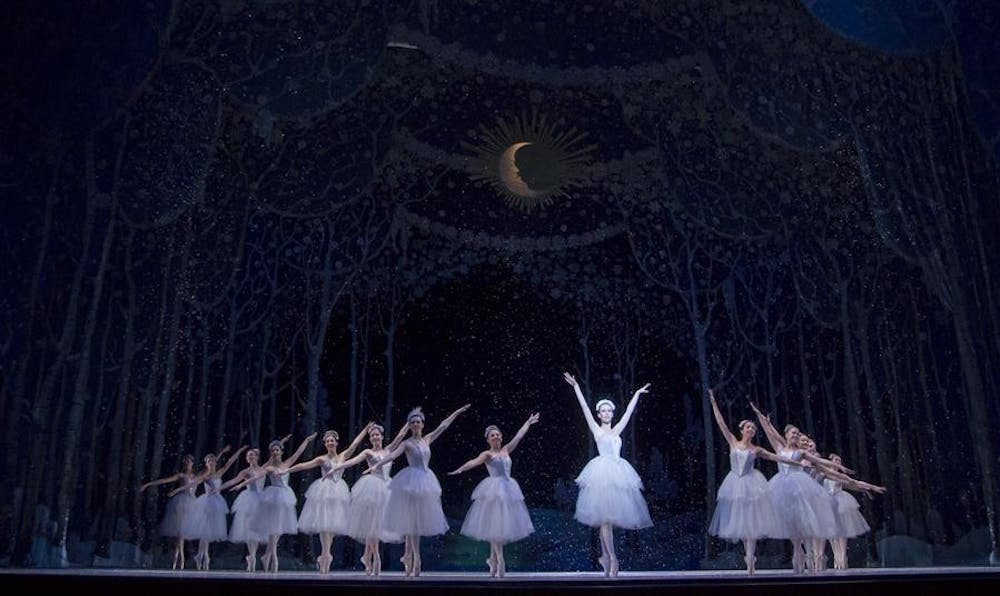Mice will battle, queens will entertain and a little girl named Clara will be rescued by a valiant Nutcracker this weekend.
Hopefully, there won’t be any bats.
Peter Ilyich Tchaikovsky’s “The Nutcracker” will premiere 8 p.m. Friday at the Musical Arts Center. This is the 54th year IU has produced the show.
During this year’s first dress rehearsal, an uncast bat made an appearance, senior Jacob Taylor said.
Taylor plays several roles, including the Cavalier.
The cast was practicing the first scene of the show in which the adults dance in a circle and are meant to look sophisticated and majestic.
Someone shouted, “Bat.”
A black mass fluttered across the stage as the cast stared. It disappeared into the ceiling.
The orchestra kept playing, and the dancers continued the steps — but they couldn’t stop laughing.
“The Nutcracker,” perhaps Tchaikovsky’s most famous work, is also one he reportedly loathed.
In Disney’s “Fantasia,” Deems Taylor, the film’s master of ceremonies, said Tchaikovsky “really detested” the “Nutcracker Suite.”
The suite was published before the full ballet.
Michael Vernon, artistic director for the production and chair of the ballet department, choreographed “The Nutcracker” this year.
He said it might not have been the music Tchaikovsky despised but the original choreography and production.
Taylor said “The Nutcracker” features constantly changing music — speeding up tempo and then dropping to a slower pace, building a crescendo and then falling to a whisper — that keeps audiences coming back every year.
Vernon said “The Nutcracker” has become a seasonal tradition in the United States, though it is not nearly as popular in Europe.
“It’s very unusual to have a ballet about Christmas, or anything about Christmas,” Vernon said. “It’s like an icon.”
The story opens in 19th century Vienna as friends and family celebrate on Christmas Eve. Clara is given a nutcracker doll from her magical godfather, Herr Drosselmeyer.
Clara’s brother Fritz is jealous of the gift and breaks the Nutcracker. Drosselmeyer fixes the doll, and after the guests leave, Clara falls asleep.
When she awakens, giant mice threaten her. Drosselmeyer helps her escape, and she dashes to the living room. She sees the Christmas tree is now enormous, and she watches as mice and tin soldiers battle across the living room floor.
It is then that her Nutcracker comes to life to duel with the Mouse King.
The Nutcracker ultimately rescues Clara, and Drosselmeyer takes her on a journey that begins in the Land of Snow, finishing the act.
In Act II, Drosselmeyer takes Clara to the Land of Sweets, where she meets the Sugar Plum Fairy and the Cavalier. Clara tells the fairy the story of the battle against the Mouse King, and the Sugar Plum Fairy rewards her with a dance and entertainment from her court of angels.
This is not the first time performing in “The Nutcracker” for most of the cast.
“If you’re a ballerina, you’ve danced ‘The Nutcracker,’” said senior Alison Koroly, who will dance as the Columbine Doll on Saturday and the Sugar Plum Fairy on Sunday.
Conductor Andrea Quinn said the show is new for many members of the University
Orchestra.
“Actually, it’s quite a tricky piece, and so we have required some individual preparation on the musicians’ part above and beyond rehearsals,” Quinn said.
Vernon said part of the show’s draw for families is the presence of child dancers. He said children love to watch their peers onstage.
Clara is played by Lola Kennedy, 11, and Grace Mullins, 12.
Both girls have previously played different roles in “The Nutcracker.” Mullins’ mother said her daughter dreamed of being Clara when she played the role of an angel in the past.
“Each year she was able to add a little more personality to the role that she was playing,” Mullins’ mother said. “This year, it is about becoming Clara. It has been a process of learning more about her and what she is experiencing and making that come to life on stage.”
Both Taylor and Koroly said of the child dancers, “To be honest, they know more about what they are doing than we do.”
“And they are better behaved backstage, as well,” Koroly said.
The desire to build a fantasy to draw in the audience was strong for both student and child dancers.
Taylor said for his role as the Cavalier, a romantic “quintessential prince,” he must reinvent himself. He said he imagines himself as very regal in the ballet.
He’s a “goofy guy,” in his words, so the transformation must be complete for him to convince the audience.
“For them to be illusioned, I need to make an illusion for myself,” Taylor said.
Kennedy pointed to other illusions meant to entrance the audience. She said the ringlets crowning some of the dancers look soft, but they are hard as rocks after being doused with hairspray. The same goes for the translucent, flowing costumes, which she said are heavy and scratchy.
“But I love all of that about the show,” Kennedy said. “The ballet and the smoke and mirrors, and then all the many people involved in bringing it all together, backstage and onstage, and I get to ride in a boat through the snow and practice ballet, which I love.”
IU Ballet presents "The Nutcracker"

Get stories like this in your inbox
Subscribe





